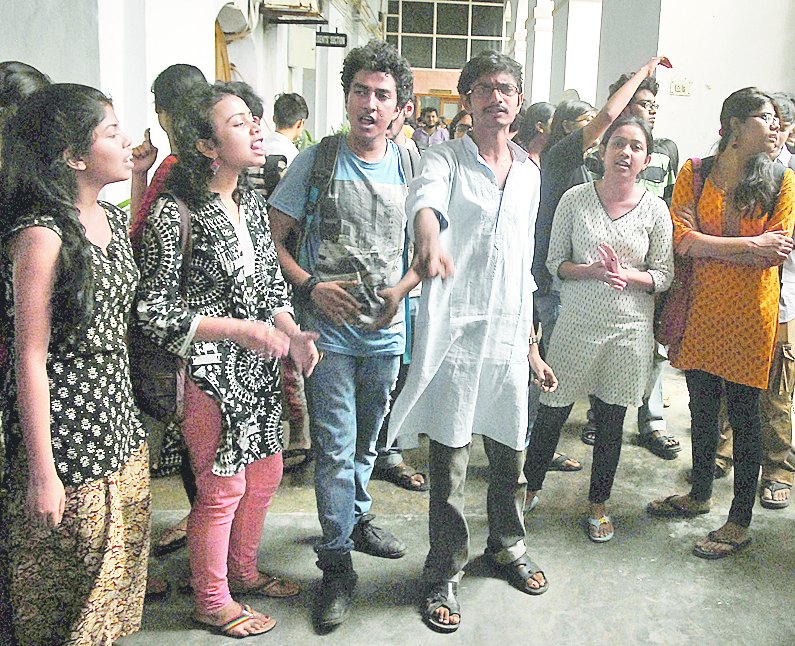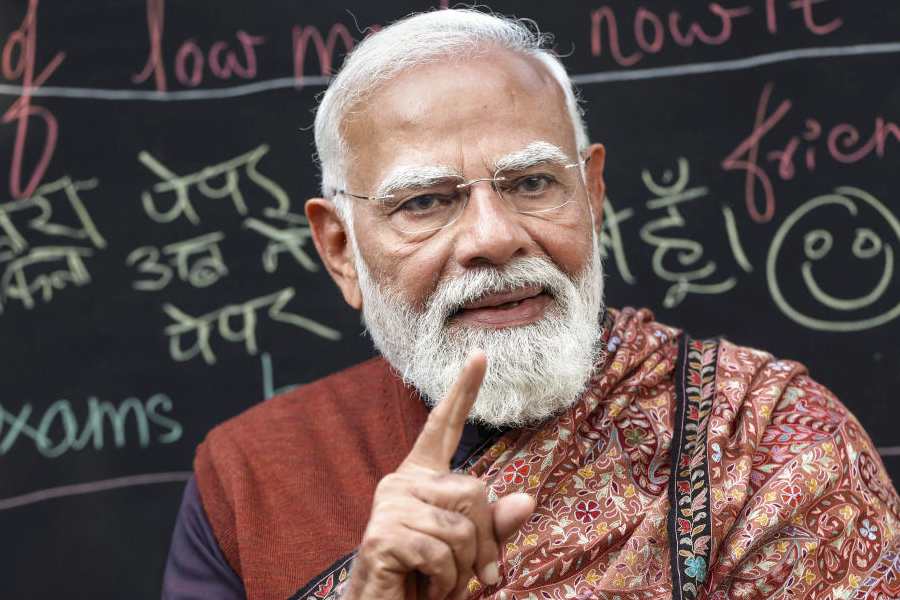
The visit to the Nagpur headquarters of the Rashtriya Swayamsevak Sangh by the former president, Pranab Mukherjee, and his presence at its Officer Training Corps 'convocation' has, not surprisingly, attracted both attention and controversy. Although many Indian notables have graced RSS platforms in the past, this was the first occasion that a former head of State and a lifelong Congress stalwart has sat alongside the RSS sarsanghchalak and observed uniformed swayamsevaks pay obeisance to the saffron flag.
For the RSS, Mukherjee's presence was unquestionably an achievement of colossal proportion. The photographs of a former president at a sangh function will, in future days, become as iconic as those of the RSS contingent marching in uniform at the Republic Day parade in 1963 - an honour in recognition of its role at the Home Front during the war with China. At the same time, the RSS's many detractors have lamented Mukherjee's presence in Nagpur as an act of betrayal and evidence that the Indian State's commitment to secularism has been seriously diluted after the Bharatiya Janata Party came to power in 2014.
There was nothing in Mukherjee's scripted speech, delivered in English, that would warrant charges of ideological heresy. The former president was unflinchingly faithful to a civics textbook version of Indian nationalism as being both inclusive, universal and epitomized by the Indian Constitution: "The construct of Indian nationalism is 'Constitutional patriotism', which consists of an appreciation of our inherited and shared diversity; a readiness to enact one's citizenship at different levels; the ability to self-correct and learn from others." Indian nationhood, he emphasized in an aside that many have construed to be a side swipe at the RSS, "is not one language, one religion, one enemy. It is the 'Perennial Universalism' of 1.3 billion people who use more than 122 languages and 1600 dialects in their everyday lives, practise seven major religions, belong to three major ethnic groups... live under one system, one flag and one identity of being Bharatiya..."
In every sense, Mukherjee's speech was a repudiation of Vinayak Damodar Savarkar's notion of Hindutva that has found favour with a small section of Hindu nationalists. Whereas Savarkar thought it prudent to equate the rights of citizenship to those who considered India to be their pitribhumi (fatherland) and punnyabhumi (holy land), Mukherjee stuck to the letter and spirit of the Constitution and the mainstream inheritance of the freedom struggle.
Mukherjee's implicit disavowal of Savarkar should not have offended those in the RSS who have been tutored in the organization's philosophy. Whereas Savarkar's Hindutva was explicitly political, the RSS's version of Hindutva is cultural. It, along with the BJP with which it has a complicated but fraternal relationship, believes that the unity of India is born of a cultural (which incorporates Hinduism as a civilization) underpinning whose foundations are essentially Hindu in nature. Although the Congress has never explicitly recognized this basis of nationhood, individual Congress stalwarts, particularly before Independence, tacitly acknowledged the quintessentially Hindu character of India. In the assessment of S. Gopal, Jawaharlal Nehru's official biographer: "The old stalwarts of the Congress... such as (Vallabhbhai) Patel, Rajendra Prasad, with the backing of the leader of the Hindu Mahasabha, Shyama Prasad Mookerjee, believed not so much in a theocratic state as in a state which symbolised the interests of the Hindu majority."
More problematic, for the RSS, was the former president's invocation of 'Constitutional patriotism' to define contemporary Indian nationalism. As an idea, 'Constitutional patriotism' originated in post-War Germany as the means to bolster German nationhood without invoking a very troubled past. Since then, the term has been appropriated by the votaries of European integration and has involved a belief in a 'Year Zero' - the date from which the continent has made a fresh start, breaking with a fractious past dominated by nation states and aggressive nationalisms.
In the context of India, 'Constitutional patriotism' would imply that Indian nationhood was inaugurated on January 26, 1950, and whose parameters were defined by the 'basic structures' of the written Constitution. This essentially means that today's India does not acknowledge a pre-history, a formulation that Mukherjee certainly did not acknowledge in a speech that invoked the traditions of the freedom struggle. On its part, the RSS believes that India is an ancient nation - the Hindu rashtra - with a modern Constitutional State. Sangh ideologues would invoke Radha Kumud Mookerji's The Fundamental Unity of India (first published in 1913) that located the idea of India in ancient Sanskrit religious and secular literature, Buddhist tracts and the geographical spread of the country's holy sites. To this could be added the collective historical memory of resistance and adaptation to "Muslim invaders" (Mukherjee's term) and British colonizers. Indeed, even Mukherjee would find the idea that India's live inheritance began from 1950 quite outrageous. The Constitution sets out the rules governing political conduct and public policy. It is also an input in modern nationhood but does not exclusively define it. Indeed, in hindsight, it would seem that 'Constitutional patriotism' was quite needlessly grafted on to a speech that is remarkable for its unqualified espousal of a 1950s-style nationalism, evolved when the post-Independence optimism hadn't been cluttered by an excess of competitive politics and the demands of entitlement.
Indeed, the reassuring facet of Mukherjee's speech was that it was terribly old-style (who else in this day and age would quote the civil servant-historian, Vincent Smith) and was representative of an age when the Congress in Bengal used nationalism to confront its communist opponents. That it was also an instant hit in RSS-friendly circles was equally revealing. It is indicative of the extent to which the saffron brotherhood, grappling with the complexities and challenges of political power, has moved away from the exclusivism that defined the Hindu nationalism of Savarkar and M.S. Golwalkar.
At the end of the day, the misgivings over Mukherjee's presence in Nagpur and his speech have come from within the Congress and from circles that see themselves unflinchingly and uncompromisingly secular.
To a large extent, the objections are centred on the demonology around the RSS. In secular circles, the RSS is regarded as quasi-fascist and an untouchable. Any association with it is regarded as taboo and the question of dialogue does not arise. In gracing an RSS function, Mukherjee implicitly acknowledged the RSS as a relevant and legitimate strand of nationalism.
More important, however, was his unwitting rejection of a political strand - increasingly influential within the post-Sonia Gandhi Congress - that has discarded composite nationalism in favour of a fragmented identity politics. To a new breed of secular warriors, the project to reclaim power and relevance must involve championing the 'marginalized' and self-conscious minorities. This is a politics of warped liberalism borrowed uncritically from the West. As the political scientist, Mark Lilla, has argued in his new book, The Once and Future Liberal, identity liberalism "is mesmerized by symbols: achieving superficial diversity in organizations, retelling history to focus on marginal and often minuscule groups, concocting inoffensive euphemisms to describe social reality, protecting young ears and eyes... from any disturbing encounter with alternative viewpoints." What has been left out of the narrative is the idea of We, the sense of common destiny.
In his own way - and perhaps quite unwittingly - Mukherjee's Nagpur intervention has helped focus attention on a debate that concerns all of India, not merely fractions of the population. The RSS is an important element of this debate, as is the old (and increasingly marginalized) Congress tradition that links the past with the present.










